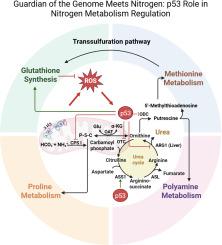The impact of p53 on the urea cycle and nitrogen metabolism enzymes: Mechanisms and implications for cancer development
IF 4.2
2区 生物学
Q2 BIOCHEMISTRY & MOLECULAR BIOLOGY
Biochimica et biophysica acta. Molecular basis of disease
Pub Date : 2025-08-20
DOI:10.1016/j.bbadis.2025.168024
引用次数: 0
Abstract
The tumour suppressor protein p53, encoded by the TP53 gene, is widely celebrated as the “guardian of the genome,” yet its role in metabolic reprogramming, particularly nitrogen metabolism, remains underappreciated. This review highlights the emerging nexus between p53 and the urea cycle, a key pathway responsible for ammonia detoxification and the generation of biosynthetic precursors. By regulating the expression and activity of urea cycle enzymes, p53 exerts profound control over interconnected metabolic pathways, including the metabolism of polyamine, methionine, glutathione, and proline. Cancer cells, with their voracious nitrogen demand, co-opt urea cycle dysregulation to fuel tumour growth and survival. Here, we synthesise the latest insights into p53's role in nitrogen homeostasis, delineating its broader implications for cellular metabolism and carcinogenesis. Additionally, we propose the strategic targeting of urea cycle enzymes as novel prognostic biomarkers and therapeutic vulnerabilities in cancer. This work not only redefines the metabolic scope of p53 but also positions nitrogen metabolism at the forefront of cancer research, offering transformative avenues for therapeutic innovation.

p53对尿素循环和氮代谢酶的影响:癌症发展的机制和意义
由TP53基因编码的肿瘤抑制蛋白p53被广泛认为是“基因组的守护者”,但它在代谢重编程,特别是氮代谢中的作用仍未得到充分认识。这篇综述强调了p53和尿素循环之间的新联系,尿素循环是负责氨解毒和生物合成前体生成的关键途径。通过调节尿素循环酶的表达和活性,p53对相互关联的代谢途径,包括多胺、蛋氨酸、谷胱甘肽和脯氨酸的代谢具有深远的控制作用。由于癌细胞对氮的需求量巨大,它们会利用尿素循环失调来促进肿瘤的生长和存活。在这里,我们综合了p53在氮稳态中的作用的最新见解,描绘了其对细胞代谢和致癌的更广泛的影响。此外,我们提出尿素循环酶作为新的预后生物标志物和癌症治疗脆弱性的战略目标。这项工作不仅重新定义了p53的代谢范围,而且将氮代谢定位于癌症研究的前沿,为治疗创新提供了变革性的途径。
本文章由计算机程序翻译,如有差异,请以英文原文为准。
求助全文
约1分钟内获得全文
求助全文
来源期刊
CiteScore
12.30
自引率
0.00%
发文量
218
审稿时长
32 days
期刊介绍:
BBA Molecular Basis of Disease addresses the biochemistry and molecular genetics of disease processes and models of human disease. This journal covers aspects of aging, cancer, metabolic-, neurological-, and immunological-based disease. Manuscripts focused on using animal models to elucidate biochemical and mechanistic insight in each of these conditions, are particularly encouraged. Manuscripts should emphasize the underlying mechanisms of disease pathways and provide novel contributions to the understanding and/or treatment of these disorders. Highly descriptive and method development submissions may be declined without full review. The submission of uninvited reviews to BBA - Molecular Basis of Disease is strongly discouraged, and any such uninvited review should be accompanied by a coverletter outlining the compelling reasons why the review should be considered.

 求助内容:
求助内容: 应助结果提醒方式:
应助结果提醒方式:


